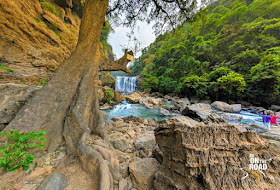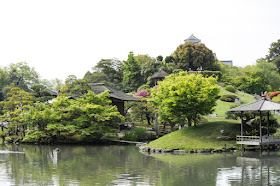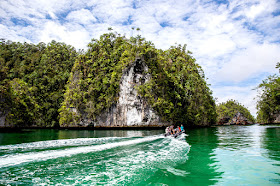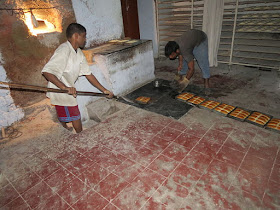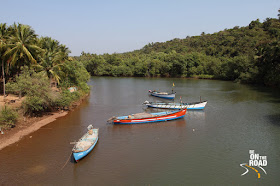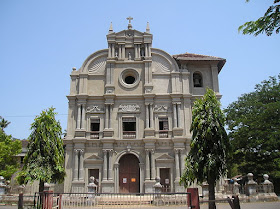
Do you like waterfall holidays? Do you like herbal baths? Do you like to swim under a waterfall? If you said ‘YES’ to all 3 questions, then you will definitely be interested in Vibhooti Falls, a gorgeous jungle waterfall tucked deep in the forests of the Western Ghats in the Uttara Kannada region of Karnataka.
The journey of Vibhooti falls starts somewhere near the Yana limestone rocks and caves deep in the forests of the Western Ghats surrounded by the Sahyadri mountain range. As its name ‘Vibhuti’, this waterfall is powerful and resplendent. It tumbles in multiple levels after many small streams join together while passing through swathes of herbal and medicinal plants. And the best part about this waterfall is that it has a large and deep enough pool that allows you to swim right under the waterfall and not worry about under currents or sharp rocks.

A scenic forest drive and a short trek leads you to this tropical beauty. Ideally, you should visit Yana rocks and caves first as that requires a lot of walking in the tropical sun. And then when you visit Vibhooti falls, you can simply lounge in the pool and cool yourself off. Its pool is shallow at one end and deep towards the waterfall, thus allowing people of all ages and swimming abilities to enjoy this waterfall.

It is a raging torrent during the monsoons and is ideal for nature lovers and photographers. Bathing or swimming during the monsoons would be impossible and not recommended. But, during the post monsoon season, the water levels are more manageable and thus perfect for a dream tropical waterfall holiday with friends and family. During the sultry summer months, waterfall would be a tiny trickle, but you can always lounge in the pool.

If relaxed herbal baths under a waterfall while being surrounded by lush forests is your idea for a holiday, then Vibhooti falls is a fantastic choice. The entire forest, waterfall, nature and outdoors package of this holiday is special is a must-experience on your next long weekend from Bangalore.

Best season to visit:
The monsoons are the best time to visit if you wish to see the waterfall in its full glory. However, if you wish to swim in the pool under the waterfall, then post monsoon season from October through February would be ideal as that is when water flow would be manageable.
Summers can be best avoided due to low water levels and high temperature and humidity levels.

How to reach here:
The nearest airport would be Hubli, though Goa International airport and Bangalore international airport offer the best pan India connectivity.
Hubli, Ankola and Kumta would be your nearest railway stations.
Sirsi, Gokarna and Kumta would be your best bets when it comes to bus stations.
If you are driving from Gokarna, the route would be Gokarna –> Andle –> Onibail –> Santepete –> Markal –> Hillur –> Achave –> Mabagi –> Vibhooti Falls
If you are driving from Kumta, the route would be Kumta –> Divgi –> Antravalli –> Devimani Ghat –> Khurse –> Manjaguni –> Devanahalli –> Yana cross –> Mabagi –> Vibhooti Falls
If you are driving from Sirsi, the route would be Sirsi –> Kalkuni –> Hegdekatta –> Devenahalli –> Yana cross –> Mabagi – > Vibhooti Falls
Where to stay:
If you prefer homestays, there are quite a few options in the Sirsi-Yellapur region. My favorite is Tavuramane homestay, a fantastic rustic destination surrounded by pristine greenery.
If you prefer luxurious resorts, opt for the ones near Gokarna, Yellapur or Dandeli.
For simple hotels, Sirsi, Yellapur, Dandeli and Gokarna offer good options.
For beach stays, look for properties in and around Gokarna.

Where to eat:
The nearest place to eat is a small restaurant at Mabagi village, about 3 kms away.
If you want better places to eat, then you will have to try out the restaurants in either Sirsi, Gokarna or Kumta. Each of these places should be about 60 to 90 minutes from Vibhooti Falls depending on road conditions.
It is best to have some food and water with you at all times due to the lack of eating options in the vicinity.

Other nearby tourist attractions:
1) Yana caves – two tall limestone rocks and caves jutting out in the middle of dense jungle
2) Magod Falls – one of the most magnificent waterfalls in Uttara Kannada
3) Sathodi Falls – Karnataka’s prettiest jungle waterfall
4) Shivapura hanging bridge – a suspension bridge on the river Kali
5) Unchalli waterfalls – one of the tallest waterfalls in Karnataka
6) Arbail ghat – one of the wettest places of Karnataka
7) Beaches of Kumta, Ankola and Gokarna







